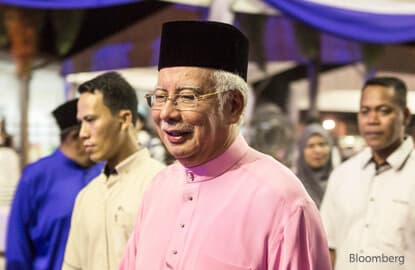
KUALA LUMPUR (June 18): Voters in two Malaysian districts head to the polls Saturday in by-elections that will indicate the extent of Prime Minister Najib Razak’s hold on his party.
More than 42,600 people in Sungai Besar in Selangor state and 33,000 in Kuala Kangsar in the northern Perak region will pick new lawmakers after a helicopter crash last month killed incumbents from Najib’s United Malays National Organisation, or UMNO.
The vote is the first test of public support for Najib on peninsular Malaysia after a year of political turmoil over funding scandals. Losses or narrower victories could spur concern in UMNO about his ability to steer it to another win in a national election due by 2018. Equally, a strong win for seats already held by UMNO would bolster his grip.
Former leader Mahathir Mohamad has recently lost traction in his bid to convince party officials that Najib is a liability and will cost them a reign unbroken since 1957. Most UMNO divisional chiefs back the premier, even amid concerns about slowing growth and its impact on ethnic Malays, the cornerstone of the party. Convincing wins would help Najib silence the Mahathir-led murmurings about his leadership.
"Najib desperately needs these wins," said Ahmad Martadha Mohamed, dean of the college of law, government and international studies at Universiti Utara Malaysia. "It will validate his position that despite all the problems he’s facing, they are able to win. Otherwise, his status will be in the balance, especially as president of UMNO."
Sarawak win
Ruling coalition Barisan Nasional, or BN, secured a bigger majority in recent elections in Malaysia’s biggest state of Sarawak, but a vote across the South China Sea on Borneo island was dominated by local issues. Voters on the peninsula may be more attuned to the turmoil surrounding the premier.
Najib, 62, has battled graft accusations since July and denied wrongdoing. He was cleared by the attorney general this year over revelations that $681 million appeared in his accounts before the 2013 election. The money was a donation from the Saudi royal family and most was later returned, the government said. The premier has also been embroiled in probes into the finances of troubled state fund 1Malaysia Development Bhd.
Ministers in Najib’s cabinet have made daily trips to the two constituencies, shaking hands and at times handing out bags of rice and other aid to the poor. They are seeking to counter an opposition focusing on questions about Najib’s credibility. In a Twitter post on Friday, Najib told voters not to taken in by what he called the opposition’s games.
‘Better access’
"I support the opposition more than BN, but you have to also think about who has better access to the government, who can get more things done and who can improve your life," said Mei, an ethnic Chinese fruit seller in Sekinchan town in Sungai Besar who would give only a partial name. "You have to look out for your own interests, and not what the prime minister did or didn’t do."
A divided opposition may make it easier for BN coalition to win, and the presence of multiple candidates may assist it.
Two opposition groups are running against UMNO for both seats, while an independent candidate has turned Kuala Kangsar into a four-cornered battle. UMNO won Sungai Besar in 2013 in a straight fight, and Kuala Kangsar in a three-way race, both by narrow margins.
Race, religion
Racial and religious issues are coming to the fore of Malaysian politics, including the past two weeks of campaigning. UMNO, in power since independence, won the 2013 ballot by its slimmest-ever result as Chinese and Indian electors deserted Najib’s coalition.
Since then, Najib has move to woo the Malay majority. He has reached out to the opposition Parti Islam se-Malaysia and proposed they work to promote Islam’s doctrines. PAS, which is pushing for the Islamic penal code to be implemented in a state it controls, is also competing on Saturday.
Under PAS’s hudud laws, adulterers and apostates could face death by stoning, while those found guilty of theft could have their hands amputated.
About 68 percent of voters in Kuala Kangsar are Malay, 24 percent are Chinese, and Indians and other ethnicities make up the rest, according to the Bernama news agency. In Sungai Besar, Malays make up about 67 percent of voters, while 31 percent are Chinese and the rest minority groups.
"BN will need to work hard to win, as there are many Chinese who aren’t happy about hudud and the fact UMNO is trying to get close to PAS," said Yusof Asri, a barber who lives around the Sungai Besar area, gesturing a hand being chopped off. "I’m telling all my friends to vote wisely."